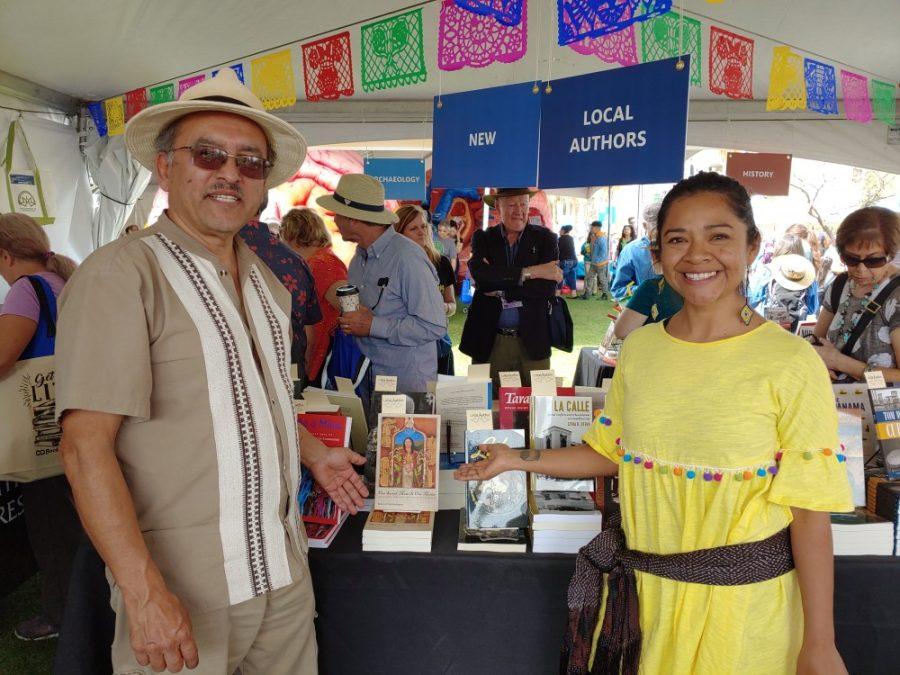Yazmin Novelo is a Maya singer, educator and radio show host who came to the University of Arizona to promote The Maya Maiz Roots Conference, taking place April 24-28. The five-day conference will travel to Arizona State University, Pima Community College and the UA.
Novelo came to Tucson to speak and promote the conference at the Maya Maiz Rap Artist Meet and Greet and Art Auction held March 1 at La Indita restaurant. She and rapper Pat Boy are featured in the song and music video “Xíimbal Kaaj,” performed in Mayan. They are both from Mexico and of Maya heritage.
“Mayan people is not a people of the past … We are people from today,” Novelo said. “That video wants to show that we are people who are walking with all the world.”
RELATED: Students, community rally around support for Mexican American Studies as trial begins
Novelo doesn’t consider herself a hip-hop artist, as she has only recorded the one song. However, she plays in a rock band and sings in genres such as funk and reggae. She also hosts a Maya radio station, is a sociolinguist and teaches at the Autonomous University of Yucatán in Mérida, Mexico.
Novelo is working to help preserve the Yucatec Maya language alongside Roberto Rodríguez, associate professor in the Mexican American Studies Department at UA, who is coordinating the upcoming conference.
Rodríguez said the people referred to as Mexican or Latino in this country are at least a generation removed from their original Maya culture.
“When you get separated from the culture, the language, then you no longer have that culture. You have traces of it perhaps,” Rodríguez said. “I think people have developed this idea like, ‘Wait a minute, we are part of Maíz culture,’ and Maíz culture is thousands of years old.”
The conference focuses on the connection Maya culture has with maíz (corn), which has a lot of history, according to Rodríguez.
“There’s many peoples in Mexico, but there’s a commonality, and that commonality is maíz,” Rodríguez said. “They have different names, but in the end it’s still one basic culture, the maíz culture.”
Novelo also discussed the importance of maíz and how it connects to her culture.
“We are a people of corn. Our origin is the corn,” Novelo said. “We eat the corn, and when we die, we are born again in the corn.”
Another idea behind the conference is for Maya educators to share their history, culture and identity in response to the 2010 law passed in Arizona which banned the teaching of Mexican-American studies in the state. The law was permanently struck down in late 2017 by a federal judge who deemed the law unconstitutional.
“I would say [the conference] is going to be very historic,” Rodríguez said. “When there was this controversy here, this idea that things from the Maya should not be taught in Arizona, that was really off base.”
Interested in the debate around this law, Rodríguez traveled to Yucatán to attend multiple conferences about the Maya language to see what the Maya teach in their schools. He met Novelo at one of the conferences and wanted to bring her to Arizona for The Maya Maiz Roots Conference as both an educator and a singer.
Novelo said she learned Mayan because her family spoke it. Although they are fluent in it, Novelo can understand it but cannot speak it.
“My parents speak Mayan and my grandfathers, my grandmothers, too,” Novelo said. “I never speak in Mayan, but I can hear and understand.”
Novelo and Rodríguez spoke about how it’s a violent process to take a person’s language and culture, and that’s what they are fighting against by trying to preserve Yucatec Maya language.
“The question that people who are not Mayan [have to ask] is: ‘Am I being part of that violent environment with my acts or no?'” Novelo said. “I think that’s the way college students and other people can help.”
RELATED: New course examines Mexican pop culture
Novelo said she believes the future of language preservation ultimately depends on what people decide to do with the information given to them.
She said if no changes are made the language will be lost. However, she believes if people work together, they can increase the amount of people that speak Yucatec Mayan and bring more awareness to it.
“We are like other people, just we are linked with our past,” Novelo said.
The conference is free but requires registration and is open to students, educators and the Arizona community.
Follow Quincy Sinek on Twitter









